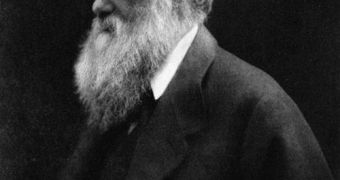There is among creationists a group of people who support the idea of intelligent design, which basically states that the process of evolution, in the Universe and on Earth, was guided by a higher power. Now, researchers demonstrated belief in ID is oftentimes motivated by the fear of death.
Those who believe in this idea (which is not a theory, and cannot be put on par with evolution) say that some of the structures that evolved over time are simply too complex to have developed naturally.
The human eye and the mitochondria are oftentimes used as examples to support this idea. But the view is simplistic, and represents an effort to reconcile scientific discoveries with the obsolete views of religion in general.
In the new study, a team of experts from the University of British Columbia (UBC), in Canada, say that people are more likely to believe in ID when confronted with thoughts and fears of death.
This makes perfect sense psychologically. “People want to see science as providing their life with greater meaning, and on the surface, intelligent design does that whereas evolution does not,” explains Jessica Tracy.
“It might help explain why there is such intense widespread support for intelligent design,” adds the UCB expert, who was a researcher on the new study. Details of the work appear in the March issue of the peer-reviewed scientific journal PLoS ONE.
Past investigations have proven that fear of death has far-reaching consequences, in nearly all aspects of our lives. Intelligent design provides an easy way out, as it's a lot easier to trust in a higher power than simply stare the world in the face.
“We try to forget most of the time that we are mortal. It's impossible to forget, it's real, it's out there, it becomes harder and harder to deny that,” Tracy explains, quoted by LiveScience.
She adds that, though ID does not support the existence of an afterlife “officially,” it's enough for people to think of an “intelligent designer” for them to be reassured. This contributes to lowering their fear of death, even if it's not true.
“The whole reason we have religion is that it is comforting. Intelligent design is doing something very similar. Traditional science's goal isn't to comfort; there really is no goal other than to understand,” the UCB expert adds.
In recent times, ID proponents have been arguing that this idea is a theory, and that it deserves to be considered right alongside Charles Darwin's theory of evolution through natural selection. However, ID doesn't meet the requirements of being cataloged as a scientific theory.
Such studies are important because religious/spiritual countries, as well as individuals, tend to guide their decision and actions based on these principles. When those actions affect everyone, something needs to be done.
In the United States – unlike any other advanced countries – belief in the supernatural, fantasy and religion is still high, with 40 percent of the population saying that they believe the literal interpretation of the Christian Bible.
Around 38 percent of the population says it believes in ID, while a mere 16 percent say that they accepted evolution as their predominant worldview. Usually, in rich, civilized and developed countries, belief in higher powers and the incidence of religious dogmas decrease with wealth.
“What intelligent design does explicitly say is there is a purpose to human life. […] That we are here for a reason and there is a larger purpose to it. That's an incredibly different idea than evolution,” Tracy adds.
“Teaching people that science or a naturalist view can be meaningful makes people more interested in the theory that has actual scientific validity even when they are in a state of existential anxiety,” she concludes.

 14 DAY TRIAL //
14 DAY TRIAL //